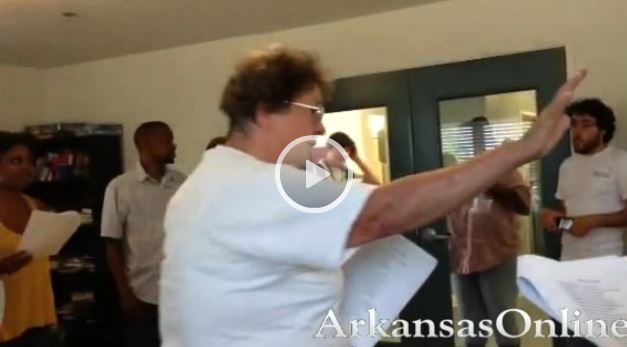Shelter starts program involving play reading, insult hurling
By Kelly Poe
PHOTO BY WILLIAM KENYON
LITTLE ROCK — It’s been a while since Alvin Hall has been involved in theater.
He’s a resident of the Our House homeless shelter, and, in recent years, he’s had more immediate things to worry about.
On Saturday, he joined 13 other people as they hurled Shakespearean insults, shouted lines from Macbeth and read poetry in iambic pentameter.
He said he was in a better mood when he left.
Saturday was the shelter’s first “Shakespeare in the Shelter” session, conducted by Roslyn Knutson, a retired English professor from the University of Arkansas at Little Rock.
“I’ve always been attracted to Shakespeare. Othello is one of my favorite plays,” Hall said. “I’d like to gain a little bit more knowledge about participating in theater.”
Depending on the interest of the participants, the group might perform a full production of Richard III by the end of the summer, Our House case manager Joy Ritchey said.
Ritchey got the inspiration for the program after she met three lonely women – Portia, Cordelia and Ophelia – who came to the shelter.
Ritchey assesses every resident at the shelter, and more than 75 percent describe themselves as profoundly lonely, she said. The classes will help residents be more social, she said.
“We’re a long-term shelter. We’re set up to house residents for up to two years,” Ritchey said. “I was looking for a project for us to do this summer that would encourage working together, cooperation and some long-term community goals.”
Ritchey received a master’s degree in English from UALR, where Knutson was her mentor, so Ritchey invited her to lead the classes.
Georgia Mjartan, the shelter’s executive director, was also an English major with Ritchey as an instructor. Shesaid she participated in the class Saturday to reconnect with one of her favorite professors and have a good time.
“This is our first time doing ‘Shakespeare in the Shelter,’ and to my knowledge, this is the first time there has been Shakespeare in a shelter, so this is pretty cutting-edge,” Mjartan said.
Many people claim they can’t understand Shakespeare, but they actually understand far more than they think, Knutson said. She began the class by having participants take turns reading from a long list of descriptive termssuch as “your own flesh and blood” and “salad days,” many of which are in common use and all of which come from Shakespeare’s works.
The group also practiced the art of the Shakespearean insult during the workshop, calling each other names such as “rank, paper-faced rabbit sucker” and “empty-hearted nut-hook.”
The exercises were designed to loosen up participants before acting out the literature, Knutson said.
Hall said he enjoyed learning the common phrases, and he had no idea how much of his everyday speech comes from Shakespeare. He laughed and said he would like to participate in the full production of a play.
“I like a challenge,” he said.


